Fleurs du Mal Magazine


Or see the index
#1 New York Times bestseller Milk and Honey is a collection of poetry and prose about survival. About the experience of violence, abuse, love, loss, and femininity.
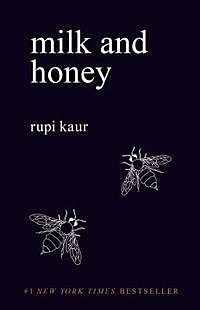 The book is divided into four chapters, and each chapter serves a different purpose. Deals with a different pain. Heals a different heartache. Milk and Honey takes readers through a journey of the most bitter moments in life and finds sweetness in them because there is sweetness everywhere if you are just willing to look.
The book is divided into four chapters, and each chapter serves a different purpose. Deals with a different pain. Heals a different heartache. Milk and Honey takes readers through a journey of the most bitter moments in life and finds sweetness in them because there is sweetness everywhere if you are just willing to look.
rupi kaur is a bestselling author and illustrator of two collections of poetry. her artistic expression began at the age of 5 when her mother handed her a paintbrush and said—draw your heart out. while studying at the university of waterloo rupi self-published her first collection milk and honey in 2014.
milk and honey became an international phenomenon that’s been translated into over 30 languages and sold over 2.5 million copies. rupi’s long-awaited second collection the sun and her flowers was published in 2017 and immediately debuted as a #1 global bestseller. through her poetry rupi explores a variety of themes ranging from love. loss. trauma. healing. femininity. migration. revolution.
rupi is a storyteller and chronicler. there’s a simplicity and nuance to her work that has found a home in the hearts of millions. this magic is best captured in her stage performances which are magnetic musical interactions of poetry art and theatre. in the years to come rupi hopes to continue her artistic exploration through art and poetry—searching for ways to understand and articulate the world around her.
Milk and Honey
by Rupi Kaur
Publisher Andrews McMeel Publishing
Publication date 10/2015
US Edition
Binding Trade Paperback
208 pages
Price € 13.50
ISBN 9781449474256
new poetry books
fleursdumal.nl magazine
More in: - Book Lovers, - Book News, Archive K-L, Archive K-L, Art & Literature News, Kaur, Rupi
Fifty years after it first appeared, one of Noam Chomsky’s greatest essays will be published for the first time as a timely stand-alone book, with a new preface by the author.
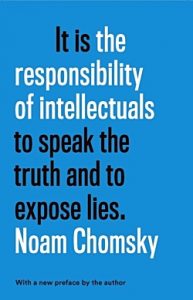 As a nineteen-year-old undergraduate in 1947, Noam Chomsky was deeply affected by articles about the responsibility of intellectuals written by Dwight Macdonald, an editor of Partisan Review and then of Politics. Twenty years later, as the Vietnam War was escalating, Chomsky turned to the question himself, noting that “intellectuals are in a position to expose the lies of governments” and to analyze their “often hidden intentions.”
As a nineteen-year-old undergraduate in 1947, Noam Chomsky was deeply affected by articles about the responsibility of intellectuals written by Dwight Macdonald, an editor of Partisan Review and then of Politics. Twenty years later, as the Vietnam War was escalating, Chomsky turned to the question himself, noting that “intellectuals are in a position to expose the lies of governments” and to analyze their “often hidden intentions.”
Originally published in the New York Review of Books, Chomsky’s essay eviscerated the “hypocritical moralism of the past” (such as when Woodrow Wilson set out to teach Latin Americans “the art of good government”) and exposed the shameful policies in Vietnam and the role of intellectuals in justifying it.
Also included in this volume is the brilliant The Responsibility of Intellectuals Redux, written on the tenth anniversary of 9/11, which makes the case for using privilege to challenge the state. As relevant in 2017 as it was in 1967, The Responsibility of Intellectuals reminds us that “privilege yields opportunity and opportunity confers responsibilities.”
All of us have choices, even in desperate times.
Title The Responsibility of Intellectuals
Author Noam Chomsky
Publisher New Press, The
Format Hardcover
Nb of pages 112 p.
ISBN-10 162097343X
ISBN-13 9781620973431
Hardcover – $16.95
Publication Date 07 November 2017
fleursdumal.nl magazine
More in: - Book News, - Book Stories, Archive C-D, Art & Literature News, LITERARY MAGAZINES, MONTAIGNE, Noam Chomsky, PRESS & PUBLISHING
Nu haar moeder naar de radio luistert, moeten ze stil zijn. `Wat is er zo interessant aan Radio Formosa?’ vraagt Mels.
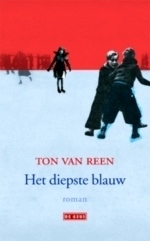 `Soms hoort ze namen van mensen die ze kent of die uit haar geboortestreek afkomstig zijn. Ze wacht op een antwoord van haar ouders. Ze heeft hun al vaak de groeten laten doen, maar ze hoort nooit iets terug.
`Soms hoort ze namen van mensen die ze kent of die uit haar geboortestreek afkomstig zijn. Ze wacht op een antwoord van haar ouders. Ze heeft hun al vaak de groeten laten doen, maar ze hoort nooit iets terug.
‘
`Kom, we gaan’, zegt Tijger ongeduldig, maar Mels wil graag langer blijven omdat die vreemde stemmen hem fascineren.
Tijger staat al op.
Ze sluipen naar de gang, trekken hun schoenen aan en staan buiten.
Ze kijken elkaar verbaasd aan.
`China is wel heel dichtbij’, zegt Tijger. `Je hoort het gewoon op de radio.’
`Zou China ook op de televisie te zien zijn?’ vraagt Mels.
`Dat denk ik niet’, zegt Tijger. `Voor die paar mensen die televisie hebben. Op televisie zie je alleen maar concerten.’
Ton van Reen: Het diepste blauw (015)
wordt vervolgd
fleursdumal.nl magazine
More in: - Book Stories, - Het diepste blauw, Archive Q-R, Reen, Ton van
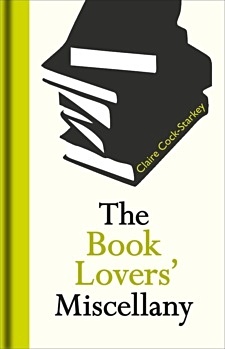 How is ink made? What is the bestselling book of all time? What are the oldest known books in the world? And how does one make sense of the colors found on Penguin paperbacks? The answers to these questions and many more await readers in The Book Lovers’ Miscellany.
How is ink made? What is the bestselling book of all time? What are the oldest known books in the world? And how does one make sense of the colors found on Penguin paperbacks? The answers to these questions and many more await readers in The Book Lovers’ Miscellany.
The Book Lovers’ Miscellany is a cornucopia for bibliophiles. With customary wisdom and wit, Claire Cock-Starkey presents a brief illustrated history of paper, binding, printing, and dust jackets, with a wealth of arcane facts that even the most avid book lovers may be hard-pressed to answer: Which natural pigments were used to decorate medieval bibles? Which animal is needed for the making of vellum? Curious facts are drawn from throughout the history of books and publishing, including many more recent examples, such as a short history of the comic and the story behind the massively successful Harlequin romance imprint Mills and Boon. Readers can explore the output of the most prolific writers and marvel at the youth of the youngest published authors—or lament the decisions of the publishers who rejected books that later became colossal bestsellers. The book also includes a collection of lists, including unfinished novels, books that have faced bans, books printed with mistakes, the most influential academic books of all time, and the longest established literary families.
The perfect gift for every bibliophile, The Book Lovers’ Miscellany is equally well suited to reading straight through or dipping into here and there.
The Book Lovers’ Miscellany
by Claire Cock-Starkey (Author)
Hardcover
ISBN: 9781851244713
Published January 15, 2018
Bodleian Library, University of Oxford
The Bodleian Library at the University of Oxford publishes books related to their collection, in some cases facsimile editons of rare or noteworthy titles. UCP distributes Bodleian Library titles in North America.
fleursdumal.nl magazine
More in: - Book Lovers, - Bookstores, Archive C-D, Art & Literature News, Libraries in Literature, PRESS & PUBLISHING, The Art of Reading
Altijd is hij blijven luisteren naar Radio Formosa, de stem van het andere China. Het vrije China van Tjiang K’ai-sjek. Een generaal die terugvocht tegen de communisten die het goede voor de mensen predikten, maar beter waren in het afhakken van hoofden.
 Elke zondagavond zond Radio Formosa twee uur uit in het Engels. Dan waren er familieberichten van en voor mensen uit de hele wereld die elkaar zochten. Chinezen die uit China waren gevlucht, verdwaald waren geraakt en hun familie hadden gevonden met behulp van Radio Formosa. Ze deden elkaar de groeten of maakten afspraken om elkaar te ontmoeten. Vaak sloegen hun stemmen over van ontroering of van enthousiasme, zodat ze als katten leken te janken.
Elke zondagavond zond Radio Formosa twee uur uit in het Engels. Dan waren er familieberichten van en voor mensen uit de hele wereld die elkaar zochten. Chinezen die uit China waren gevlucht, verdwaald waren geraakt en hun familie hadden gevonden met behulp van Radio Formosa. Ze deden elkaar de groeten of maakten afspraken om elkaar te ontmoeten. Vaak sloegen hun stemmen over van ontroering of van enthousiasme, zodat ze als katten leken te janken.
Die twee uur op zondagavond waren voor hem. Die had Lizet hem nooit af kunnen nemen. In die twee uren zocht hij naar een herkenbare stem die de groeten deed aan Thija’s moeder. Of Thija’s moeder die Thija zocht. Beide stemmen had hij bewaard in zijn hoofd.
Hij had geleerd om de Chinese stemmen van elkaar te onderscheiden. Na jaren hoorde hij of een Chinees zijn groeten overbracht uit Amerika, Hongkong of Parijs. En hoewel zijn kennis van het Chinees beperkt was gebleven, had hij steeds meer van de boodschappen begrepen omdat ze werden uitgesproken in standaardzinnen. `Mama, ik zoek je.’ `Wie kent Lin Hung die in 1957 vanuit Hongkong naar Europa is vertrokken?’ `Reünie van vluchtelingen uit Kow-Loon in Londen.’ `Ik zoek Mai-Lou, die bij mij op school zat in Kwanton.’
Ton van Reen: Het diepste blauw (014)
wordt vervolgd
fleursdumal.nl magazine
More in: - Book Stories, - Het diepste blauw, Archive Q-R, Reen, Ton van
An extraordinary debut from a young Vietnamese American, ‘Night Sky with Exit Wounds’ is a book of poetry unlike any other.
 Steeped in war and cultural upheaval and wielding a fresh new language, Vuong writes about the most profound subjects – love and loss, conflict, grief, memory and desire – and attends to them all with lines that feel newly-minted, graceful in their cadences, passionate and hungry in their tender, close attention: ‘…the chief of police/facedown in a pool of Coca-Cola./A palm-sized photo of his father soaking/beside his left ear.’
Steeped in war and cultural upheaval and wielding a fresh new language, Vuong writes about the most profound subjects – love and loss, conflict, grief, memory and desire – and attends to them all with lines that feel newly-minted, graceful in their cadences, passionate and hungry in their tender, close attention: ‘…the chief of police/facedown in a pool of Coca-Cola./A palm-sized photo of his father soaking/beside his left ear.’
This is an unusual, important book: both gentle and visceral, vulnerable and assured, and its blend of humanity and power make it one of the best first collections of poetry to come out of America in years.
Ocean Vuong was born in a rice farm outside Saigon in 1988. At the age of two, after a year in a refugee camp, he and his family arrived in the US. He is the first in his immediate family to learn how to read proficiently, at the age of eleven. With Ben Lerner as his mentor at Brooklyn College, he wrote the poems that would become this first collection. A Ruth Lilly fellow and winner of a Pushcart Prize, he has received honours and awards from Poets House and the Academy of American Poets. Night Sky with Exit Wounds won the 2016 Whiting Award. Ocean Vuong lives in New York.
Ocean Vuong:
Night Sky with Exit Wounds
English
Publ. Jonathan Cape
Published 4th April 2017
96 Pages
129mm x 197mm x 9mm
ISBN10 1911214519
ISBN13 9781911214519
Paperback
€ 11,46
# more information on website TS Eliot Prize
fleursdumal.nl magazine
More in: - Book News, Archive U-V, Art & Literature News, Awards & Prizes, Eliot, T. S., Ocean Vuong
`Doe je schoenen uit’, zegt Thija’s moeder. `We lopen altijd op kousenvoeten.’
 Bedeesd trekken Mels en Tijger hun schoenen uit en zetten ze op de deurmat.
Bedeesd trekken Mels en Tijger hun schoenen uit en zetten ze op de deurmat.
Ze lopen achter haar aan naar de kamer. Thija ligt op de bank. Ze glimlacht, verbaasd, maar ook blij over hun komst.
Ze gaan op lage stoelen zitten aan een kleine ronde tafel. De kamer is opvallend kaal. Aan de wand hangen alleen een Chinese kalender, gedrukt op riet, en zwartwitfoto’s van China die uit een tijdschrift zijn gescheurd. Platen van rijstvelden met mensen die gebukt staan naar het water, hun handen vol jonge planten.
`In net zo’n dorp hebben wij gewoond’, zegt Thija. `Maar ik weet er nog maar weinig van. Ik herinner me alleen de geur van de natte velden. Ook als ik in bed lag, rook alles naar modder. Misschien herinner ik me het alleen maar omdat mijn moeder er zo vaak over vertelt.’
Opvallend zijn de koffers in een hoek, met grote koperen sloten. Ze zijn zo nadrukkelijk aanwezig dat ze lijken te zeggen: we wachten erop dat we weer op reis gaan.
Heeft Thija’s moeder in de drie jaar dat ze hier woont geen tijd gehad om de koffers uit te pakken? Het geeft Mels een bang gevoel; een vader die zich nooit laat zien en een moeder die wacht.
Thija’s moeder brengt thee. Ze pakt theekopjes uit de bovenste koffer, veegt ze schoon met een doek en schenkt in.
De thee is mierzoet, met een smaakje van munt. Mels slikt snel omdat hij de thee niet durft te weigeren. Zijn slokdarm verbrandt. Hij begint te proesten. De thee komt door zijn neus naar buiten.
`Geeft niet’, zegt Thija. Ze geeft hem een doekje om zijn gezicht af te vegen. Ze presenteert chocoladekoekjes uit een supergrote doos waar voor een jaar koekjes in zitten. Zeker ook door haar vader meegebracht.
`Gaan jullie op reis?’ Mels wijst naar de koffers.
`Nee’, zegt Thija. `We blijven. Maar pas als mijn vader hier komt wonen, pakken we uit. Hij wil dat zelf doen.’
`Kunnen jullie dat niet?’
`In China leven de mensen ook met volle koffers. Dat is daar heel gewoon. Ze reizen van het ene werk naar het andere. Ze zijn altijd onderweg.’
Haar moeder is al terug naar de keuken. Ze horen haar zachtjes zingen.
`En jouw kamer?’ vraagt Tijger.
`Ik zou je graag alles laten zien,’ zegt Thija, `maar mijn moeder wil niet dat jongens in een meisjeskamer komen.’
Haar moeder heeft de radio aangezet. Vreemde stemmen klinken uit de keuken.
`Ze luistert altijd naar Radio Formosa’, zegt Thija. `Formosa is het andere China.’
`Ik weet het’, zegt Mels. `Ik heb het gezien op een kaart van grootvader Rudolf. Het is een eiland. Het is nog kleiner dan ons dorp.’
`Welnee’, zegt Thija. `Het is groter dan Frankrijk. En er wonen geen communisten.’
`Het lijkt me erg om altijd met heimwee te moeten leven, zoals je moeder.’
`Zou jij heimwee hebben naar dit dorp?’ vraagt Thija.
Mels kijkt op van haar vraag.
Ton van Reen: Het diepste blauw (013)
wordt vervolgd
fleursdumal.nl magazine
More in: - Book Stories, - Het diepste blauw, Archive Q-R, Reen, Ton van
Als das Letzte Epos hat Peter Handke seinen neuen Roman bezeichnet.
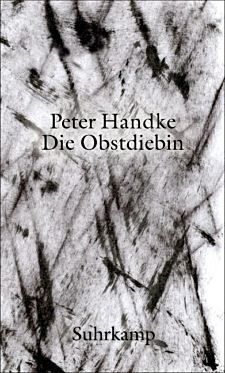 Mit der Niederschrift begann er am 1. August 2016: »Diese Geschichte hat begonnen seinerzeit an einem jener Mittsommertage, da man beim Barfußgehen im Gras wie eh und je zum ersten Mal im Jahr von einer Biene gestochen wird.« Dieser Stich wird, wie der Autor am 2. August festhält, zum »Zeichen«. »Ein gutes oder ein schlechtes? Weder als gutes noch als ein schlechtes, gar böses – einfach als ein Zeichen. Der Stich jetzt gab das Zeichen, aufzubrechen. Zeit, daß du dich auf den Weg machst. Reiß dich los von Garten und Gegend. Fort mit dir.
Mit der Niederschrift begann er am 1. August 2016: »Diese Geschichte hat begonnen seinerzeit an einem jener Mittsommertage, da man beim Barfußgehen im Gras wie eh und je zum ersten Mal im Jahr von einer Biene gestochen wird.« Dieser Stich wird, wie der Autor am 2. August festhält, zum »Zeichen«. »Ein gutes oder ein schlechtes? Weder als gutes noch als ein schlechtes, gar böses – einfach als ein Zeichen. Der Stich jetzt gab das Zeichen, aufzubrechen. Zeit, daß du dich auf den Weg machst. Reiß dich los von Garten und Gegend. Fort mit dir.
Die Stunde des Aufbruchs, sie ist gekommen.«Die Reise führt aus der Niemandsbucht, Umwegen folgend, sie suchend, in das Landesinnere, wo die Obstdiebin, »einfache Fahrt«, keine Rückfahrt, bleiben wird, oder auch nicht?. Am 30. November 2016, dem letzten Tag der Niederschrift des Epos, resumiert Peter Handke die ungeheuerlichen und bisher nie gekannten Gefahren auf ihrem Weg dorthin: »Was sie doch in den drei Tagen ihrer Fahrt ins Landesinnere alles erlebt hatte: seltsam. Oder auch nicht?
Nein, seltsam. Bleibend seltsam. Ewig seltsam.«
Peter Handke wird am 6. Dezember 1942 in Griffen (Kärnten) geboren. Die Familie mütterlicherseits gehört zur slowenischen Minderheit in Österreich; der Vater, ein Deutscher, war in Folge des Zweiten Weltkriegs nach Kärnten gekommen. Zwischen 1954 und 1959 besucht Handke das Gymnasium in Tanzenberg (Kärnten) und das dazugehörige Internat. Nach dem Abitur im Jahr 1961 studiert er in Graz Jura. Im März 1966, Peter Handke hat sein Studium vor der letzten und abschließenden Prüfung abgebrochen, erscheint sein erster Roman Die Hornissen. Im selben Jahr 1966 erfolgt die Inszenierung seines inzwischen legendären Theaterstücks Publikumsbeschimpfung in Frankfurt am Main in der Regie von Claus Peymann.
Seitdem hat er mehr als dreißig Erzählungen und Prosawerke verfaßt, erinnert sei an: Die Angst des Tormanns beim Elfmeter (1970), Wunschloses Unglück (1972), Der kurze Brief zum langen Abschied (1972), Die linkshändige Frau (1976), Das Gewicht der Welt (1977), Langsame Heimkehr (1979), Die Lehre der Sainte-Victoire (1980), Der Chinese des Schmerzes (1983), Die Wiederholung (1986), Versuch über die Müdigkeit (1989), Versuch über die Jukebox (1990), Versuch über den geglückten Tag (1991), Mein Jahr in der Niemandsbucht (1994), Der Bildverlust (2002), Die Morawische Nacht (2008), Der Große Fall (2011), Versuch über den Stillen Ort (2012), Versuch über den Pilznarren (2013).
Auf die Publikumsbeschimpfung 1966 folgt 1968, ebenfalls in Frankfurt am Main uraufgeführt, Kaspar. Von hier spannt sich der Bogen weiter über Der Ritt über den Bodensee 1971), Die Unvernünftigen sterben aus (1974), Über die Dörfer (1981), Das Spiel vom Fragen oder Die Reise zum sonoren Land (1990), Die Stunde da wir nichts voneinander wußten (1992), über den Untertagblues (2004) und Bis daß der Tag euch scheidet (2009) über das dramatische Epos Immer noch Sturm (2011) bis zum Sommerdialog Die schönen Tage von Aranjuez (2012) zu Die Unschuldigen, ich und die Unbekannte am Rand der Landstraße (2016).
Darüber hinaus hat Peter Handke viele Prosawerke und Stücke von Schriftsteller-Kollegen ins Deutsche übertragen: Aus dem Griechischen Stücke von Aischylos, Sophokles und Euripides, aus dem Französischen Emmanuel Bove (unter anderem Meine Freunde), René Char und Francis Ponge, aus dem Amerikanischen Walker Percy.
Sein Werk wurde mit zahlreichen internationalen Preisen ausgezeichnet. Die Formenvielfalt, die Themenwechsel, die Verwendung unterschiedlichster Gattungen (auch als Lyriker, Essayist, Drehbuchautor und Regisseur ist Peter Handke aufgetreten) erklärte er selbst 2007 mit den Worten: »Ein Künstler ist nur dann ein exemplarischer Mensch, wenn man an seinen Werken erkennen kann, wie das Leben verläuft. Er muß durch drei, vier, zeitweise qualvolle Verwandlungen gehen.
Peter Handke
Die Obstdiebin oder Einfache Fahrt ins Landesinnere
EAN: 9783518427576
ISBN: 3518427571
Libri: 3844323
Suhrkamp Verlag AG
November 2017
559 Seiten
gebunden
€34,00
new books
fleursdumal.nl magazine
More in: - Book News, - Bookstores, Archive G-H, Art & Literature News, Peter Handke
The story of how literature shaped world history, in sixteen acts—from Alexander the Great and the Iliad to Don Quixote and Harry Potter
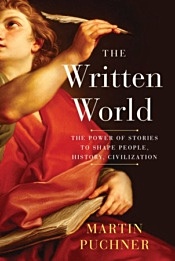 In this groundbreaking book, Martin Puchner leads us on a remarkable journey through time and around the globe to reveal the powerful role stories and literature have played in creating the world we have today.
In this groundbreaking book, Martin Puchner leads us on a remarkable journey through time and around the globe to reveal the powerful role stories and literature have played in creating the world we have today.
Puchner introduces us to numerous visionaries as he explores sixteen foundational texts selected from more than four thousand years of world literature and reveals how writing has inspired the rise and fall of empires and nations, the spark of philosophical and political ideas, and the birth of religious beliefs. Indeed, literature has touched the lives of generations and changed the course of history.
At the heart of this book are works, some long-lost and rediscovered, that have shaped civilization: the first written masterpiece, the Epic of Gilgamesh; Ezra’s Hebrew Bible, created as scripture; the teachings of Buddha, Confucius, Socrates, and Jesus; and the first great novel in world literature, The Tale of Genji, written by a Japanese woman known as Murasaki.
Visiting Baghdad, Puchner tells of Scheherazade and the stories of One Thousand and One Nights, and in the Americas we watch the astonishing survival of the Maya epic Popol Vuh. Cervantes, who invented the modern novel, battles pirates both real (when he is taken prisoner) and literary (when a fake sequel to Don Quixote is published).
We learn of Benjamin Franklin’s pioneering work as a media entrepreneur, watch Goethe discover world literature in Sicily, and follow the rise in influence of The Communist Manifesto.
We visit Troy, Pergamum, and China, and we speak with Nobel laureates Derek Walcott in the Caribbean and Orhan Pamuk in Istanbul, as well as the wordsmiths of the oral epic Sunjata in West Africa.
Throughout The Written World, Puchner’s delightful narrative also chronicles the inventions—writing technologies, the printing press, the book itself—that have shaped religion, politics, commerce, people, and history.
In a book that Elaine Scarry has praised as “unique and spellbinding,” Puchner shows how literature turned our planet into a written world.
Martin Puchner is the Byron and Anita Wien Professor of English and Comparative Literature at Harvard University. His prize-winning books range from philosophy to the arts, and his bestselling six-volume Norton Anthology of World Literature and HarvardX MOOC (massive open online course) have brought four thousand years of literature to students across the globe. He lives in Cambridge, Massachusetts.
The Written World
The Power of Stories to Shape
People, History, Civilization
By Martin Puchner
Hardcover
Oct.2017
448 Pages
$32.00
ISBN 9780812998931
Published by Random House
new books
fleursdumal.nl magazine
More in: - Book News, - Book Stories, Archive O-P, Art & Literature News, NONFICTION: ESSAYS & STORIES, PRESS & PUBLISHING, The Art of Reading
In the years since he first had the idea of prescribing short, powerful poems for all manner of spiritual ailments, William Sieghart has taken his Poetry Pharmacy around the length and breadth of Britain, into the pages of the Guardian, onto BBC Radio 4 and onto the television, honing his prescriptions all the time.
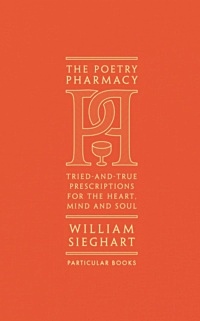 This pocket-sized book presents the most essential poems in his dispensary: those which, again and again, have really shown themselves to work. Whether you are suffering from loneliness, lack of courage, heartbreak, hopelessness, or even from an excess of ego, there is something here to ease your pain.
This pocket-sized book presents the most essential poems in his dispensary: those which, again and again, have really shown themselves to work. Whether you are suffering from loneliness, lack of courage, heartbreak, hopelessness, or even from an excess of ego, there is something here to ease your pain.
– ‘The book is delightful; it rightly resituates poetry in relation to its biggest and most serious task: helping us to live and die well’ – Alain de Botton
William Sieghart
The Poetry Pharmacy
Tried-and-True Prescriptions for the Heart, Mind and Soul
Published September 2017
Hardback
176 Pages
£12.99
Particular Books
Penguin Books Ltd
ISBN: 9781846149542
new books
fleursdumal.nl magazine
More in: - Book Lovers, - Book News, Archive S-T, Archive S-T, Art & Literature News
 Hij had dat nooit moeten toelaten. Hij had over zich laten lopen. Tijger ook. Ze was zo dwingend dat grootvader Bernhard haar wel eens `de kleine generaal’ had genoemd. Grootvader had begrepen dat ze hen als poppen aan touwtjes liet dansen.
Hij had dat nooit moeten toelaten. Hij had over zich laten lopen. Tijger ook. Ze was zo dwingend dat grootvader Bernhard haar wel eens `de kleine generaal’ had genoemd. Grootvader had begrepen dat ze hen als poppen aan touwtjes liet dansen.
Door die houding had ze dingen voor hen geheim kunnen houden. Ze vertelde vaak over China, maar nooit iets over thuis. Als ze haar ophaalden, moesten ze steeds voor de deur wachten. Het was vreemd dat zij altijd bij hen thuis kwam en dat ze maar één keer bij haar waren geweest. Die keer dat ze haar waren gaan opzoeken toen ze een paar dagen ziek was.
Ze hadden aangebeld, hun handen vol bloemen en sinaasappels. Haar moeder had de deur geopend en kon hen niet buiten laten staan. Deze keer niet.
Ton van Reen: Het diepste blauw (012)
wordt vervolgd
fleursdumal.nl magazine
More in: - Book Stories, - Het diepste blauw, Archive Q-R, Reen, Ton van
The Nobel Lecture in Literature, delivered by Kazuo Ishiguro (The Remains of the Day and When We Were Orphans) at the Swedish Academy in Stockholm, Sweden, on December 7, 2017, in an elegant, clothbound edition.
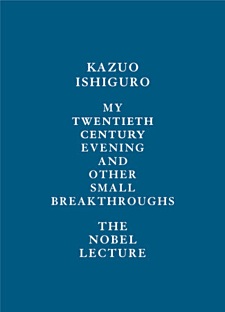 In their announcement of the 2017 Nobel Prize in Literature, the Swedish Academy recognized the emotional force of Kazuo Ishiguro’s fiction and his mastery at uncovering our illusory sense of connection with the world. In the eloquent and candid lecture he delivered upon accepting the award, Ishiguro reflects on the way he was shaped by his upbringing, and on the turning points in his career—“small scruffy moments . . . quiet, private sparks of revelation”—that made him the writer he is today.
In their announcement of the 2017 Nobel Prize in Literature, the Swedish Academy recognized the emotional force of Kazuo Ishiguro’s fiction and his mastery at uncovering our illusory sense of connection with the world. In the eloquent and candid lecture he delivered upon accepting the award, Ishiguro reflects on the way he was shaped by his upbringing, and on the turning points in his career—“small scruffy moments . . . quiet, private sparks of revelation”—that made him the writer he is today.
With the same generous humanity that has graced his novels, Ishiguro here looks beyond himself, to the world that new generations of writers are taking on, and what it will mean—what it will demand of us—to make certain that literature remains not just alive, but essential.
An enduring work on writing and becoming a writer, by one of the most accomplished novelists of our generation.
My Twentieth Century Evening and
Other Small Breakthroughs
The Nobel Lecture
By Kazuo Ishiguro
Hardcover
Dec 12, 2017
64 Pages
$16.95
Published by Knopf
64 Pages
ISBN 9780525654957
new books
fleursdumal.nl magzine
More in: - Book News, Archive I-J, Awards & Prizes, Kazuo Ishiguro, Literary Events
Thank you for reading Fleurs du Mal - magazine for art & literature